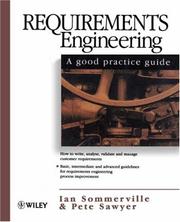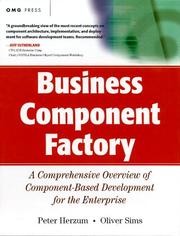| Listing 1 - 10 of 29 | << page >> |
Sort by
|
Book
ISBN: 1498377432 Year: 2010 Publisher: Washington, D.C. : International Monetary Fund,
Abstract | Keywords | Export | Availability | Bookmark
 Loading...
Loading...Choose an application
- Reference Manager
- EndNote
- RefWorks (Direct export to RefWorks)
The Early Warning Exercise (EWE) draws together a combination of analytical techniques, practical experience, seasoned judgment and unique databases in order to assess the potential consequences associated with economic and financial tail risks. There are several key features of the exercise. First, the exercise aims to help prevent the occurrence of financial crises and to limit their potential damage, not to predict the timing of crises. Second, coverage is fairly comprehensive, including both advanced and emerging economies. Third, the EWE is based on rigorous analysis and cutting-edge techniques, but it uses a holistic approach, drawing also various other tools rather than relying on a single crisis model. Fourth, it combines empirical analysis with forward-looking thinking, based on inputs from key policymakers and academics, in-depth real-world knowledge from practitioners, and seasoned judgment from IMF experts. The primary purpose of the EWE is to identify as early as possible the buildup of underlying vulnerabilities that predispose a system to a crisis, so that corrective policies can be implemented and contingency plans put in place.
Book
ISBN: 9780113313273 Year: 2011 Publisher: London TSO
Abstract | Keywords | Export | Availability | Bookmark
 Loading...
Loading...Choose an application
- Reference Manager
- EndNote
- RefWorks (Direct export to RefWorks)
Project management --- 658.404 --- ICT-tools : Software --- Industrial project management --- Management --- Outils ICT : Software --- Business management
Book
ISBN: 1845417437 1845417445 9781845417451 1845417453 9781845417444 9781845417437 9781845417420 9781845417413 1845417429 1845417410 Year: 2020 Publisher: Bristol, UK Blue Ridge Summit, PA
Abstract | Keywords | Export | Availability | Bookmark
 Loading...
Loading...Choose an application
- Reference Manager
- EndNote
- RefWorks (Direct export to RefWorks)
This book aims to shed light on the use of various modelling tools and simulation techniques in the domains of tourism and hospitality. It offers an essential introduction to the most popular methods used for modelling and simulating systems and phenomena of interest, and an overview of these techniques and methods. The main concept of each technique and method is examined and case studies and links to free online tutorials and other helpful resources are provided. The volume aims to encourage students, researchers and practitioners in tourism and hospitality to enhance and enrich their toolbox in order to achieve a better and more profound knowledge of their field.
Tourism --- Hospitality industry --- System analysis. --- Mathematical models. --- Research --- Methodology. --- computer modelling. --- modelling and stimulation for tourism. --- modelling tools. --- network analysis. --- quantitative methods. --- stimulation techniques.
Book
Year: 2019 Publisher: Washington, D.C. : The World Bank,
Abstract | Keywords | Export | Availability | Bookmark
 Loading...
Loading...Choose an application
- Reference Manager
- EndNote
- RefWorks (Direct export to RefWorks)
This project, based on the Public Expenditure and Financial Accountability (PEFA) data set, researched how PEFA can be used to shape policy development in public financial management (PFM) and other major relevant policy areas such as anticorruption, revenue mobilization, political economy analysis, and fragile states.The report explores what shapes the PFM system in low- and middle-income countries by examining the relationship between political institutions and the quality of the PFM system. Although the report finds some evidence that multiple political parties in control of the legislature is associated with better PFM performance, the report finds the need to further refine and test the theories on the relationship between political institutions and PFM.The report addresses the question of the outcomes of PFM systems, distinguishing between fragile and nonfragile states. It finds that better PFM performance is associated with more reliable budgets in terms of expenditure composition in fragile states, but not aggregate budget credibility. Moreover, in contrast to existing studies, it finds no evidence that PFM quality matters for deficit and debt ratios, irrespective of whether a country is fragile or not.The report also explores the relationship between perceptions of corruption and PFM performance. It finds strong evidence of a relationship between better PFM performance and improvements in perceptions of corruption. It also finds that PFM reforms associated with better controls have a stronger relationship with improvements in perceptions of corruption compared to PFM reforms associated with more transparency.The last chapter looks at the relationship between PEFA indicators for revenue administration and domestic resource mobilization. It focuses on the credible use of penalties for noncompliance as a proxy for the type of political commitment required to improve tax performance. The analysisshows that countries that credibly enforce penalties for noncompliance collect more taxes on average.
Anti-Corruption --- Budget Credibility --- Diagnostic Tools --- Domestic Revenue --- Fiscal Outcomes --- Fragile States --- Good Governance --- Political Economy --- Political Institution --- Public Financial Management
Book
ISBN: 0749475269 9780749475260 9780749475253 Year: 2016 Publisher: [London?] Kogan Page
Abstract | Keywords | Export | Availability | Bookmark
 Loading...
Loading...Choose an application
- Reference Manager
- EndNote
- RefWorks (Direct export to RefWorks)
Manufacturing processes --- Lean manufacturing --- Lean production --- Waste minimization --- Industrial processing --- Manufacture --- Process engineering (Manufactures) --- Processes, Manufacturing --- Processing, Industrial --- Production processes --- Industrial arts --- Production engineering --- Machine-tools --- Materials --- E-books
Book
ISBN: 0749477806 9780749477806 9780749477790 Year: 2016 Publisher: [Place of publication not identified]
Abstract | Keywords | Export | Availability | Bookmark
 Loading...
Loading...Choose an application
- Reference Manager
- EndNote
- RefWorks (Direct export to RefWorks)
This case study shows how to apply linear programming techniques to product planning and product mix decisions.
Linear programming --- Manufacturing processes --- Industrial processing --- Manufacture --- Process engineering (Manufactures) --- Processes, Manufacturing --- Processing, Industrial --- Production processes --- Industrial arts --- Production engineering --- Machine-tools --- Materials --- Production scheduling --- Programming (Mathematics) --- E-books

ISBN: 0471974447 Year: 1997 Publisher: Chichester John Wiley & Sons
Abstract | Keywords | Export | Availability | Bookmark
 Loading...
Loading...Choose an application
- Reference Manager
- EndNote
- RefWorks (Direct export to RefWorks)
Computer software --- System analysis. --- Systems engineering --- 005.1 --- 654 --- AA / International- internationaal --- 681.3*D21 --- Engineering systems --- System engineering --- Engineering --- Industrial engineering --- System analysis --- Network analysis --- Network science --- Network theory --- Systems analysis --- System theory --- Mathematical optimization --- Development of computer software --- Software development --- 681.3*D21 Requirements/specifications: languages; methodologies; tools (Software engineering)--See also {681.3*D31} --- Requirements/specifications: languages; methodologies; tools (Software engineering)--See also {681.3*D31} --- Development --- Informatieverwerking. Bureautica --- Design and construction --- Computer architecture. Operating systems
Book
ISBN: 3038353884 3038267732 9783038267737 9783038353881 9783038353881 Year: 2015 Publisher: Pfäffikon, Zurich, Switzerland
Abstract | Keywords | Export | Availability | Bookmark
 Loading...
Loading...Choose an application
- Reference Manager
- EndNote
- RefWorks (Direct export to RefWorks)
International Symposium on Measurement and Quality Control (ISMQC) is one of the most important scientific events that is normally held once in every three years in the field of measurements and quality control. During ISMQC 2013 that were selected by Programme Committee to be published in the Special Issue of ""Key Engineering Materials"" and one additional paper whose subject fits perfectly the scope of the symposium.
Quality assurance. --- Quality control. --- Factory management --- Industrial engineering --- Reliability (Engineering) --- Sampling (Statistics) --- Standardization --- Quality assurance --- Quality of products --- Quality control --- Manufacturing processes --- Production management --- Industrial management --- Measuring instruments --- Instruments, Measuring --- Measurement --- Measuring tools --- Scientific apparatus and instruments --- Business administration --- Business enterprises --- Business management --- Corporate management --- Corporations --- Industrial administration --- Management, Industrial --- Rationalization of industry --- Scientific management --- Management --- Business --- Industrial organization --- Manufacturing management --- Industrial processing --- Manufacture --- Process engineering (Manufactures) --- Processes, Manufacturing --- Processing, Industrial --- Production processes --- Industrial arts --- Production engineering --- Machine-tools --- Materials --- Monitoring --- Standards --- Instruments --- E-books

ISBN: 0471327603 9780471327608 Year: 2000 Publisher: New York, N.Y. Wiley
Abstract | Keywords | Export | Availability | Bookmark
 Loading...
Loading...Choose an application
- Reference Manager
- EndNote
- RefWorks (Direct export to RefWorks)
Computer. Automation --- Component software --- Object-oriented programming (Computer science) --- Business --- Data processing --- -Component software --- 681.3*D21 --- 681.3*D22 --- 681.3*D29 --- AA / International- internationaal --- 654 --- Computer programming --- Object-oriented methods (Computer science) --- Document Object Model (Web site development technology) --- Computer software --- Trade --- Economics --- Management --- Commerce --- Industrial management --- Requirements/specifications: languages; methodologies; tools (Software engineering)--See also {681.3*D31} --- Tools and techniques: decision tables; flow charts; modules and interfaces; programmer workbench; software libraries; structured programming; top-down programming; user interfaces (Software engineering) --- Management: copyrights; cost estimation; life cycle; productivity; programming teams; software configuration management; software quality assurance; SQA (Software engineering)--See also {681.3*K63}; {681.3*K64} --- Informatieverwerking. Bureautica. --- 681.3*D29 Management: copyrights; cost estimation; life cycle; productivity; programming teams; software configuration management; software quality assurance; SQA (Software engineering)--See also {681.3*K63}; {681.3*K64} --- 681.3*D22 Tools and techniques: decision tables; flow charts; modules and interfaces; programmer workbench; software libraries; structured programming; top-down programming; user interfaces (Software engineering) --- 681.3*D21 Requirements/specifications: languages; methodologies; tools (Software engineering)--See also {681.3*D31} --- Electronic data processing --- Informatieverwerking. Bureautica --- Business - Data processing
Book
ISBN: 0818607076 0818647078 0444701249 9780818607073 9780444701244 Year: 1986 Volume: EH0245-1 Publisher: Washington (D.C.): IEEE computer society press
Abstract | Keywords | Export | Availability | Bookmark
 Loading...
Loading...Choose an application
- Reference Manager
- EndNote
- RefWorks (Direct export to RefWorks)
Programming --- Computer software --- Logiciels --- Development --- Développement --- -681.3*D0 --- 681.3*D21 --- 681.3*D2m --- 681.3*I22 --- Software, Computer --- Computer systems --- Computerwetenschap--?*D0 --- Requirements/specifications: languages; methodologies; tools (Software engineering)--See also {681.3*D31} --- Rapid prototyping; reusable software (Software engineering) --- Automatic programming: automatic analysis of algorithms; program modification; program synthesis; program transformation; program verification (Artificialintelligence)--See also {681.3*D12}; {681.3*F31} --- 681.3*D22 --- AA / International- internationaal --- 654 --- Tools and techniques: decision tables; flow charts; modules and interfaces; programmer workbench; software libraries; structured programming; top-down programming; user interfaces (Software engineering) --- Informatieverwerking. Bureautica. --- 681.3*I22 Automatic programming: automatic analysis of algorithms; program modification; program synthesis; program transformation; program verification (Artificialintelligence)--See also {681.3*D12}; {681.3*F31} --- 681.3*D2m Rapid prototyping; reusable software (Software engineering) --- 681.3*D21 Requirements/specifications: languages; methodologies; tools (Software engineering)--See also {681.3*D31} --- 681.3*D22 Tools and techniques: decision tables; flow charts; modules and interfaces; programmer workbench; software libraries; structured programming; top-down programming; user interfaces (Software engineering) --- 681.3*D0 --- Development of computer software --- Software development --- Informatieverwerking. Bureautica --- Computer software - Development --- Software engineering --- Proceedings
| Listing 1 - 10 of 29 | << page >> |
Sort by
|

 Search
Search Feedback
Feedback About UniCat
About UniCat  Help
Help News
News